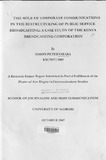| dc.description.abstract | This study set out to find out the role that corporate communications played in the restructuring of KBC in the five years beginning in August 2003 when Mr Wachira Waruru was appointed Managing Director with the express mandate to revitalize the then struggling state broadcaster.
The study focused on two populations from which samples were drawn: the audiences of KBC . (external publics) and corporation’s employees (internal publics). The key finding of the study was that corporate communications played the role of providing information to both internal and external publics on changes at KBC.
Another key finding was that the most effective communications strategies for employees were in order of ranking were internal memos, immediate supervisors, notice boards, staff meetings, direct mail/letters, conferences/workshops, and KBC’s radio and television channels. For external publics, the most effective communication channels were KBC’s radio and television channels, corporate advertising, product/service realignment through more balanced news coverage, change of corporate identity, polishing the corporate image, and changing die programming strategy.
The study further revealed that KBC has a multiple image i.e. it is perceived differendy by its internal and external publics. For instance, while a significant portion of the external publics feel that KBC has changed and today has a better corporate image, most of the employees felt that not much had improved at KBC. Staff reported low morale, dissatisfaction with pay package, exclusion from decision-making and either felt that KBC had a bleak future or were not sure.
In conclusion, the study found that the provision of information or creation of awareness was the main role played by corporate communications in the restructuring of KBC. This and other roles such as socialization, and advertising resulted in a change of perceptions especially the station’s external publics. Ihe findings on the employees were however noi conclusive as many of them feel nothing has improved at KBC.
IV | en_US |



